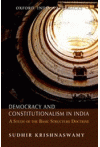- Author(s): Sudhir Krishnaswamy
- Publisher: Oxford University Press
- Edition: 1 Ed 2010
- ISBN 13 9780198071617
- Approx. Pages 244 + Contents
- Format Paperback
- Approx. Product Size 21 x 14 cms
- Delivery Time Normally 7-9 working days
- Shipping Charge Extra (see Shopping Cart)
............................................................................................
Description
The basic structure doctrine was announced by the Supreme Court in Kesavananda Bharati v. State of Kerala in 1973. This doctrine places substantive limits on the amending power and has subsequently been applied to other forms of state action. This work makes two arguments: first, that basic structure review is an independent and distinct type of constitutional judicial review which applies to all forms of state action to ensure that such action does not 'damage or destroy' 'basic features of the Constitution'. These basic features of the constitution are identified through a common law technique and are general constitutional rules which are supported by several provisions of the constitution. Second, I argue that the basic structure doctrine like other types of constitutional judicial review possesses a sound constitutional basis and rests on a sound and justifiable interpretation of the constitution. The basic structure doctrine is founded on an interpretation of the provisions of the constitution granting amending, executive, and legislative power that relies on multi-povisional implications drawn from other important provisions of the constitution. The legitimacy of basic structure review may be assessed under three categories: legal, moral, and sociological. The legal legitimacy of such review is established by defending a structuralist interpretation as a coherent and justifiable model of constitutional interpretation. The moral legitimacy of basic structure review rests on a rejection of majoritarian versions of democracy and the adoption of a dualist model of deliberative decision-making in a constitutional democracy. The sociological legitimacy of the doctrine is, to a large extent, contingent on the success of the moral and legal legitimacy arguments.
............................................................................................
Table of Contents
1. Amending Power: The Constitutional Basis for Basic Structure Review
2. The Broadening Scope of Basic Structure Review: Emergency, Legislative, and Executive Powers
3. Applying Basic Structure Review: The Limits of State Action and the Standard of Review
4. Grounds of Review: Basic Features of the Constitution
5. Legitimacy of the Basic Structure Doctrine
Bibliography
Statute Index
Case Index
Subject Index
............................................................................................
Author Details
Sudhir Krishnaswamy

